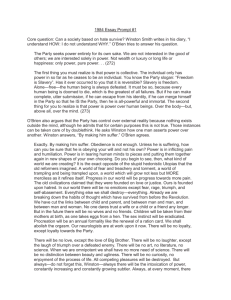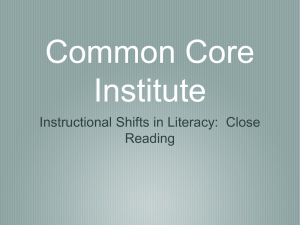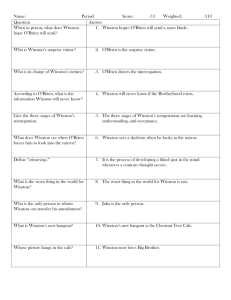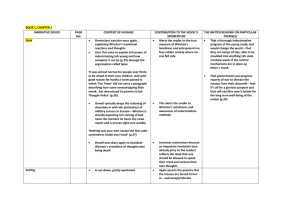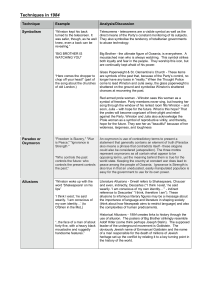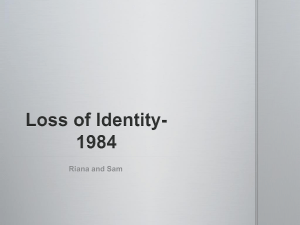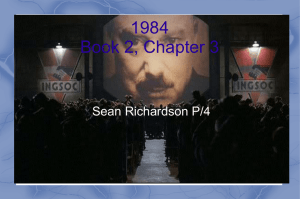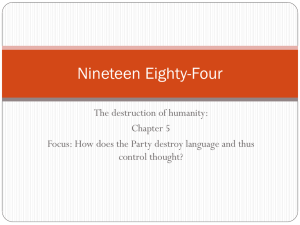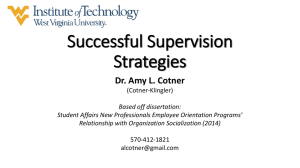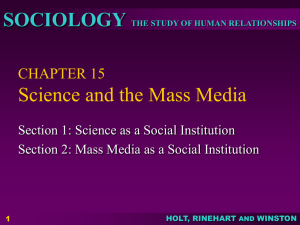Study Questions
advertisement
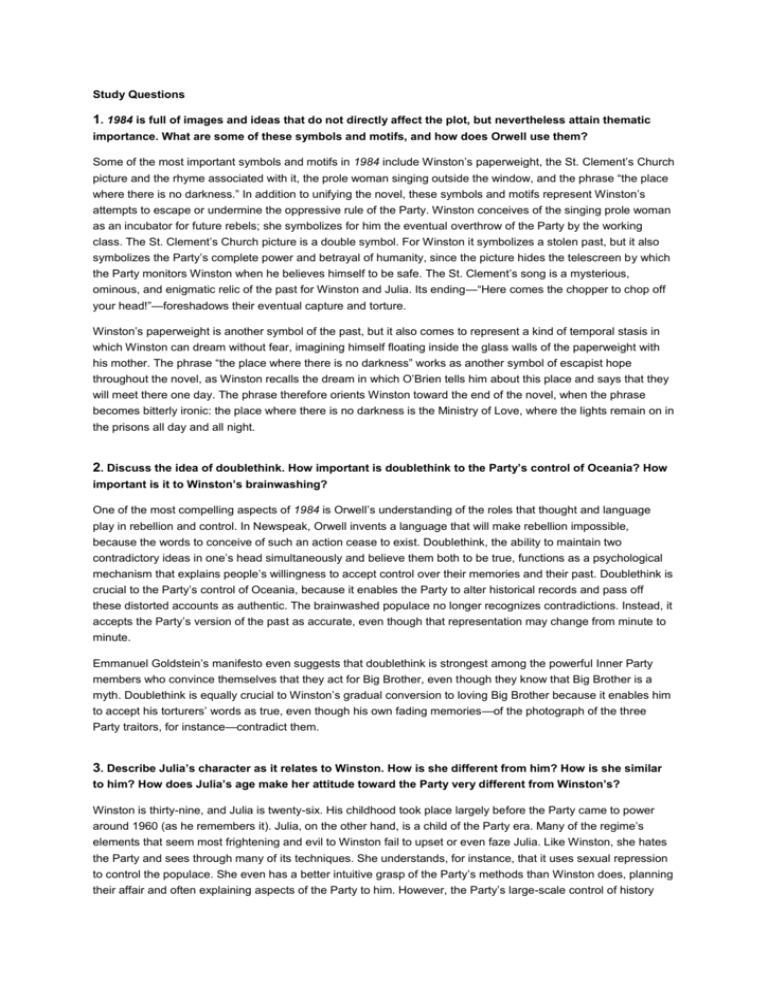
Study Questions 1. 1984 is full of images and ideas that do not directly affect the plot, but nevertheless attain thematic importance. What are some of these symbols and motifs, and how does Orwell use them? Some of the most important symbols and motifs in 1984 include Winston’s paperweight, the St. Clement’s Church picture and the rhyme associated with it, the prole woman singing outside the window, and the phrase “the place where there is no darkness.” In addition to unifying the novel, these symbols and motifs represent Winston’s attempts to escape or undermine the oppressive rule of the Party. Winston conceives of the singing prole woman as an incubator for future rebels; she symbolizes for him the eventual overthrow of the Party by the working class. The St. Clement’s Church picture is a double symbol. For Winston it symbolizes a stolen past, but it also symbolizes the Party’s complete power and betrayal of humanity, since the picture hides the telescreen by which the Party monitors Winston when he believes himself to be safe. The St. Clement’s song is a mysterious, ominous, and enigmatic relic of the past for Winston and Julia. Its ending—“Here comes the chopper to chop off your head!”—foreshadows their eventual capture and torture. Winston’s paperweight is another symbol of the past, but it also comes to represent a kind of temporal stasis in which Winston can dream without fear, imagining himself floating inside the glass walls of the paperweight with his mother. The phrase “the place where there is no darkness” works as another symbol of escapist hope throughout the novel, as Winston recalls the dream in which O’Brien tells him about this place and says that they will meet there one day. The phrase therefore orients Winston toward the end of the novel, when the phrase becomes bitterly ironic: the place where there is no darkness is the Ministry of Love, where the lights remain on in the prisons all day and all night. 2. Discuss the idea of doublethink. How important is doublethink to the Party’s control of Oceania? How important is it to Winston’s brainwashing? One of the most compelling aspects of 1984 is Orwell’s understanding of the roles that thought and language play in rebellion and control. In Newspeak, Orwell invents a language that will make rebellion impossible, because the words to conceive of such an action cease to exist. Doublethink, the ability to maintain two contradictory ideas in one’s head simultaneously and believe them both to be true, functions as a psychological mechanism that explains people’s willingness to accept control over their memories and their past. Doublethink is crucial to the Party’s control of Oceania, because it enables the Party to alter historical records and pass off these distorted accounts as authentic. The brainwashed populace no longer recognizes contradictions. Instead, it accepts the Party’s version of the past as accurate, even though that representation may change from minute to minute. Emmanuel Goldstein’s manifesto even suggests that doublethink is strongest among the powerful Inner Party members who convince themselves that they act for Big Brother, even though they know that Big Brother is a myth. Doublethink is equally crucial to Winston’s gradual conversion to loving Big Brother because it enables him to accept his torturers’ words as true, even though his own fading memories—of the photograph of the three Party traitors, for instance—contradict them. 3. Describe Julia’s character as it relates to Winston. How is she different from him? How is she similar to him? How does Julia’s age make her attitude toward the Party very different from Winston’s? Winston is thirty-nine, and Julia is twenty-six. His childhood took place largely before the Party came to power around 1960 (as he remembers it). Julia, on the other hand, is a child of the Party era. Many of the regime’s elements that seem most frightening and evil to Winston fail to upset or even faze Julia. Like Winston, she hates the Party and sees through many of its techniques. She understands, for instance, that it uses sexual repression to control the populace. She even has a better intuitive grasp of the Party’s methods than Winston does, planning their affair and often explaining aspects of the Party to him. However, the Party’s large-scale control of history does not interest or trouble her as it does Winston, because she does not remember a time when the Party was not in control. In stark defiance of Party doctrine, Julia enjoys sex and rebels against the Party in small ways. But growing up under the Party regime has made her apathetic to the difference between truth and falsehood. She has no patience for Winston’s desire for a categorical, abstract rejection of Party doctrine. Rather, she falls asleep when Winston reads to her from Emmanuel Goldstein’s book, epitomizing her simple, self-centered, pleasure-seeking approach to life. Suggested Essay Topics 1. Describe Winston’s character as it relates to his attitude toward the Party. In what ways might his fatalistic streak contribute to his ultimate downfall? 2. How does technology affect the Party’s ability to control its citizens? In what ways does the Party employ technology throughout the book? 3. Discuss the idea of Room 101, the place where everyone meets his or her worst fear. Keeping in mind that for most of Winston’s time at the Ministry of Love, he does not know what he will find in Room 101, what role does that uncertainty play in making Room 101 frightening? Does the cage of rats break Winston’s spirit, or does it merely play a symbolic role? 4. What role does Big Brother play within the novel? What effect does he have on Winston? Is Winston’s obsession with Big Brother fundamentally similar to or different from his obsession with O’Brien? 1. WAR IS PEACE FREEDOM IS SLAVERY IGNORANCE IS STRENGTH These words are the official slogans of the Party, and are inscribed in massive letters on the white pyramid of the Ministry of Truth, as Winston observes in Book One, Chapter I. Because it is introduced so early in the novel, this creed serves as the reader’s first introduction to the idea of doublethink. By weakening the independence and strength of individuals’ minds and forcing them to live in a constant state of propaganda-induced fear, the Party is able to force its subjects to accept anything it decrees, even if it is entirely illogical—for instance, the Ministry of Peace is in charge of waging war, the Ministry of Love is in charge of political torture, and the Ministry of Truth is in charge of doctoring history books to reflect the Party’s ideology. That the national slogan of Oceania is equally contradictory is an important testament to the power of the Party’s mass campaign of psychological control. In theory, the Party is able to maintain that “War Is Peace” because having a common enemy keeps the people of Oceania united. “Freedom Is Slavery” because, according to the Party, the man who is independent is doomed to fail. By the same token, “Slavery Is Freedom,” because the man subjected to the collective will is free from danger and want. “Ignorance Is Strength” because the inability of the people to recognize these contradictions cements the power of the authoritarian regime. 2. Who controls the past controls the future. Who controls the present controls the past. This Party slogan appears twice in the novel, once in Book One, Chapter III, when Winston is thinking about the Party’s control of history and memory, and once in Book Three, Chapter II, when Winston, now a prisoner in the Ministry of Love, talks to O’Brien about the nature of the past. The slogan is an important example of the Party’s technique of using false history to break down the psychological independence of its subjects. Control of the past ensures control of the future, because the past can be treated essentially as a set of conditions that justify or encourage future goals: if the past was idyllic, then people will act to re-create it; if the past was nightmarish, then people will act to prevent such circumstances from recurring. The Party creates a past that was a time of misery and slavery from which it claims to have liberated the human race, thus compelling people to work toward the Party’s goals. The Party has complete political power in the present, enabling it to control the way in which its subjects think about and interpret the past: every history book reflects Party ideology, and individuals are forbidden from keeping mementos of their own pasts, such as photographs and documents. As a result, the citizens of Oceania have a very short, fuzzy memory, and are willing to believe anything that the Party tells them. In the second appearance of this quote, O’Brien tells Winston that the past has no concrete existence and that it is real only in the minds of human beings. O’Brien is essentially arguing that because the Party’s version of the past is what people believe, that past, though it has no basis in real events, has become the truth. SparkNotes Editors. “SparkNote on 1984.” SparkNotes LLC. 2007. http://www.sparknotes.com/lit/1984/ (accessed October 10, 2011).
